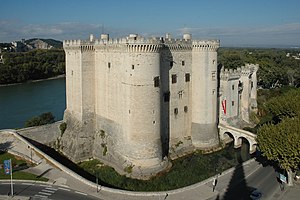Tarascon is a town on the eastern bank of the Rhône in the Provence in the southeast of France.
Understand
[edit]

The city was founded in 48 by the Romans. The town's history is shaped by "The Legend of Martha and Tarasque". According to population legend, the dragon Tarasque devoured travellers on the banks of the Rhône and was banished by Saint Martha. This legend also gave the city its current name; its previous name is said to have been Nerluc.
- 1 Office de Tourisme de Tarascon (http://www.tarascon.org/), 62 Rue des Halles, ☏ +33 4 90 91 03 52, tourisme@tarascon.org. The tourist information is located in the Art Nouveau building Le Panoramique.
Get in
[edit]Tarascon sits halfway between Arles and Avignon, around 20 km from each.
By plane
[edit]- 1 Nîmes-Garons Airport (FNI IATA). The nearest airport from Tarascon.
- 2 Avignon – Provence Airport (Avignon Airport AVN IATA). Mainly served by low-cost airlines.
- 3 Marseille-Provence Airport (MRS IATA). The nearest major international airport.
By train
[edit]The nearest TGV stations are Gare d'Avignon TGV, Arles, and Nimes.
- 4 (train station). Tarascon has its own train station, served by regional trains.
By bus
[edit]There are several bus lines from towns all over the Bouches-du-Rhône, Gard and Vaucluse. You can always buy your passage from the conductor.
By boat
[edit]While there is no regular boat line in Tarascon, you can arrive by boat in Tarascon via river cruises.
By car
[edit]Get around
[edit]In the old town, within the old city walls, there are only a few parking possibilities. However, there are parking spaces on the edge of the old town, from which it can be reached in just a few minutes.
The bus network in and around Tarascon is maintained by Envia.
Tarascon is for the most part small enough to enjoy by foot.
See
[edit]Town centre:
- 1 Château de Tarascon (Castle of King René), ☏ +334 90 91 01 93. Feb-May: 09:30-17:30; Jun-Sep: 09:30-18:30; Oct: 09:30-17:30; Nov-Jan: 09:30-17:00. As a starting point for their campaigns in the Mediterranean, the Dukes of Anjou Louis II and Louis III built fortress-like chateau from 1400 to 1435. The interior was expanded by the artistically talented King René I. After his death in 1481, the castle was used by the French royal troops as a garrison and later (until 1926) as a prison. As the site of prisoner massacres at the time of the French Revolution, the castle earned an inglorious place in history. The access via the castle moat, the inner courtyard, the main courtyard around the royal apartments and various ballrooms are worth seeing. From the roof terrace there is a beautiful view over the old town of Tarascon and to Beaucaire. Adult (25 +) €7.50, 18-24 €6.50, 10-17 €3.50, under 10 free.
- 2 Statue of Tarasque. The statue of Tarasque by P. Demaument stands right next to the castle.
- 3 Église Sainte-Marthe (Collegiate Church of the Royal College of Sainte-Marthe). 08:00-18:00; mass Sa 18:00/18:30, Su 10:30. The building from 11th-12th century was designed in the style of the Provençal Romanesque. The church with a side portal in the Provençal-Romanesque style was repeatedly renovated from the 14th to the 18th century and suffered bomb damage in 1944. In the crypt is the alleged tomb of St. Martha.
- 4 Église Saint-Jacques. Church built in 1740-1750
- 5 Couvent des Cordeliers (Cabinet de curiosities de Tartarin), Place Frederic Mistral, ☏ +33 4 90 91 38 71. M-F 10:00-12:30/13:30-18:00, Sa 13:30-18:00. The former Franciscan convent houses an exhibition on the history of Alphonse Daudet's character in the novel Tartarin de Tarascon. free.
- 6 Hôtel de Ville, place du Marché. Town hall built in 1648
- 7 Rue des Halles. Medieval street with arcades
- 8 Porte de la Condamine (at the end of Rue Jean Jaurès). A city gate built in 1379.
- 9 Porte St-Jean. A city gate built in the 18th century
- 10 Souleiado - Musée du tissu provençal, 39 rue Charles-Deméry. Private museum of Provencal Fabric
Beyond the town centre:
- 11 Chapelle Saint-Gabriel.
- 12 Abbaye Saint-Michel de Frigolet, ☏ +334 90 95 70 07. Dating from the 12th century and renovated in the 19th century and the Romanesque cloister.
- 13 Chapelle St-Victor. Romanesque chapel
Do
[edit]- Every year on the last weekend in June, the Fêtes de la Tarasque, which were founded by King René I of Anjou in 1469, are celebrated with parades of Arlèsiennes (women in local costume from Arles) and Gardians (cattle herdsmen in Camargue costume on horseback).
- On the third weekend in August, medieval festivals are held at Tarascon Castle.
- 1 Théâtre Municipal.
Buy
[edit]- The Marché aux Fleurs ("flower market") is held on the Pentecost weekend.
Eat
[edit]Drink
[edit]Sleep
[edit]- 1 Camping Tartarin, 1 route de Vallabrègues, ☏ +33 4 90 91 01 46, campingtartarin@wanadoo.fr.
Camping Saint Gabriel, Route de Fontvieille in St Etienne du Gres. Tel. : +33 4 90 91 19 83 , email: contact@campingsaintgabriel.com . Open: March-November.
Camping Municipal Alpilles Provence, Avenue du Doctor Barberin, 13103 Saint Etienne du Gres. Tel : +33 4 90 49 00 03 .
Connect
[edit]Go next
[edit]- Aix-en-Provence the city of Cézanne and the Montagne Sainte-Victoire.
- Arles
- Avignon
- Saint-Rémy-de-Provence


